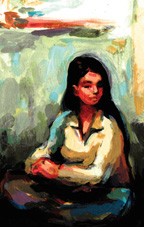 |
 |
| current issue |  | past issues |  | send a letter/news |  | address update |  | advertise |  | about us |  | alumni home |
Features
Out FrontPage 4 of 4

|
Today, Baran and Arguedas are both lawyers. Back then, they thought like students. Arguedas recalls that they were sitting behind the lawyer as he made the case that homosexuals had a communicable mental illness — "so if we had one, he was very likely to catch it!" Baran remembers that they sat horrified in the courtroom, then went into the hall and cracked up. The contrast between their responsible, good-student selves and the dangerous sick people described in court was just too absurd. "When you think about it," says Philbin, "we must have been pretty self-confident, to not let that get to us. I never remember wondering, 'Oh, my God, do I have a communicable disease?' I just remember thinking, 'These people are jerks.'"
Though the Gay Students Organization remained small, the first court victory boosted its clout (and its "cool factor," Philbin says), and members began to capitalize on the change. They would announce a social event—for instance, speaking on WUNH one day, Arguedas cooked up the idea that a softball game for gay students from around New England would take place that weekend—and magically, it would happen.
They also began taking the group's educational mission seriously, forming a speakers bureau to demystify homosexuality. Small and blond, with hair down to her waist, Arguedas would stand in front of a room of hooting and hollering fraternity brothers and explain, "This is who I am, this is who I was growing up, and then one day I fell in love with someone who to my surprise turned out to be a girl." By the end of the night, audience members would be raising their hands and asking serious questions. "It was so moving," Philbin says, "and incredibly courageous of Crissie." On the campus as a whole, the Union Leader's continued demonization of gay students ended up backfiring by making people more supportive. Kruger says of those years, "I don't remember any overt anti-gay incidents on campus, but the only gay-affirming incidents were the ones we created."
When classes resumed that fall, the Gay Students Organization seemed an established part of the campus scene. Then, on Dec. 30, 1974, the U.S. Court of Appeals in Boston upheld Bownes' ruling, establishing once and for all that the Gay Students Organization had a constitutional right to exist and hold social functions, just like every other student group on campus. The Union Leader ran more editorials, with headlines like "The Feds OK Sodomy," and Thomson made noise about appealing to the U.S. Supreme Court. But the trustees had had enough. "I don't think anybody is making any fuss about this thing except the governor and William Loeb," said trustee Charles Spanos '57.
It took 10 more months for the state Supreme Court to decide the separate state case, and that last legal pronouncement proved an anticlimax. In October 1975, the court had a simple message for the university: If you wanted to say that homosexuality was a mental disorder, you should have said it in federal court. Too late now. Case closed.
By then, most of the group's early members had graduated. Twenty years apart, Arguedas and Baran went to law school and encountered a shock: They learned that their experiences had become an important legal precedent. Baran remembers staring at the name of the federal case--"Gay Students Organization of the University of New Hampshire v. [UNH President Thomas] Bonner"--on a course syllabus and shouting to herself, "That's us!" The case has been cited in at least 50 subsequent cases and mentioned in hundreds of books and articles, and Lambda Legal's website lists it as one of the 40 most important cases affecting the rights of gay, lesbian, bisexual and transgendered people.
In the years since UNH, most of the gay student pioneers have been active in the fight against AIDS, and all have embraced other causes. Kruger, a software engineer, helped start an independent Catholic church in Virginia that welcomes diversity. Baran focuses her New York law practice on defending poor people charged with crimes. All have thriving careers and stable lives with long-term partners. Though they don't dwell on the '70s, the memories remain a source of pride. "It was a very liberating time, literally and emotionally and culturally," Maxfield says. "We educated a lot of people." Newman, the former dean of students, puts it more forcefully: "These kids were very brave to do what they did. They were pioneers of the civil rights movement."
Among the group's early members, Philbin stayed angry at UNH the longest, but over time she has mellowed. Last spring she agreed to host a UNH alumni event at the Hammer Museum in Los Angeles, where she is director. She'd said no several times before, but this time she said yes on one condition: She wanted to stand up at the gathering and tell the story of her group of friends in Durham and all the crazy and important things that happened, way back in the early days of the Gay Students Organization. ~
Jane Harrigan was a journalism professor at UNH for 23 years and is now a book editor.
Page: < Previous 1 2 3 4
Easy to print version
blog comments powered by Disqus

